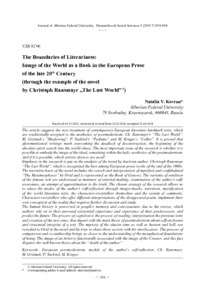The Boundaries of Literariness: Image of the World as a Book in the European Prose of the late 20th Century (through the example of the novel by Christoph Ransmayr „The Last World”)
Скачать файл:
URI (для ссылок/цитирований):
https://elib.sfu-kras.ru/handle/2311/10370Автор:
Kovtun, Natalia V.
Ковтун, Н.В.
Дата:
2014-05Аннотация:
The article suggests the new treatment of contemporary European literature landmark texts, which
are traditionally assigned to the aesthetics of postmodernism: Ch. Ransmayr’s “The Last World”,
М. Grzimek’s “Shadowing”, P. Suskind’s “Perfume” and М. Kruger’s “Cellist”. It is proved that
aforementioned writings mark overcoming the deadlock of deconstruction, the beginning of the
absolute spirit search into the world-chaos. The most important issue of the research is whether it is
possible to embody the image of the ideal, remaining within the ludic aesthetics of the postmodernism.
And if it is possible, which artistic devices are used?
Emphasis in the research is put on the analysis of the novel by Austrian author, Christoph Ransmayr
“The Last World”, which is recognized the best among European prose works of the end of the 1980s.
The narrative basis of the novel includes the search and interpretation of mystified and confabulated
“The Metamorphoses” by Ovid and is represented as the Book of Genesis. The variants of rendition
of the famous text are understood as manners of external making, examination of the author’s selfawareness,
an attempt of approximation to the truth. The chosen strategy of the research allows us
to educe the modes of the author’s self-reflection through images-masks, narration, mystification
of the world literature texts, the characters-storytellers themselves and the system of comments.
Characters-storytellers who offer different interpretations of the disappeared poem, implement their
own conception of the reality that requires further discussion and study.
The human history is preserved in people’s memory and consciousness due to the stories, which
authors rely on in their personal existential experience and experience of their predecessors, and
predict the future. The process of cognition is the process of reading, interpretation the previous texts
and creation of the new ones, that depart with the main thesis of postmodernism about self-enclosure
and structural integrity of a text. The mystery of the elusive time as well as heaven and hell, are
revealed to Ovid in the novel and he tries to share these secrets with his interlocutors. The process of
compassion and co-authorship brings us closer to the understanding of the metaphysical foundations
of being. The image of an Artist is functionally associated with the image of the Creator, and this fact
disputes the well-known thesis about the “death of the author” В статье предложена новая трактовка знаковых текстов современной европейской
литературы, традиционно относимых к эстетике постмодернизма: “Последний мир”
К.Рансмайра, “Слежка” М.Гржимека, “Парфюмер” П.Зюскинда, “Виолончелистка” М.Крюгера.
Доказывается, что названные произведения знаменуют выход из тупика деконструкции,
начало поиска Абсолюта в мире-хаосе. Важнейший вопрос статьи – возможно ли, оставаясь в
пределах игровой эстетики постмодернизма, воплотить образ идеального и, если возможно,
какими художественными средствами?
Акцент в исследовании сделан на анализе романа австрийского автора – Christoph Ransmayr
“Die letzte Welt”, признанного лучшим произведением европейской прозы конца 1980-х
годов. Сюжетную основу романа составляет поиск, интерпретация мистифицируемой
и мифологизируемой поэмы Овидия “Метаморфозы”, выступающей в роли Книги Бытия.
Варианты прочтения знаменитого текста понимаются нами как способы овнешнения,
проверки авторского самосознания, попытки приближения к истине. Избранный ракурс
исследования позволяет выявить формы авторской саморефлексии через образы-маски,
сюжетное повествование, мистификацию текстов мировой литературы, самих персонажей-
рассказчиков и систему комментариев к ним. Герои-повествователи, предлагающие различные
толкования исчезнувшей поэмы, реализуют собственное понимание действительности,
требующее дальнейшего обсуждения и проверки. Человеческая история сохраняется в
памяти, сознании людей благодаря рассказам, авторы которых опираются на собственный
экзистенциальный опыт и опыт предшественников, прогнозируют будущее. Процесс познания
суть процесс чтения, интерпретации прежних и создания новых текстов, что расходится
с основным тезисом постмодернизма о самозамкнутости, герметичности произведения.
Овидию в романе открывается тайна ускользающего времени, рая и ада, которую он пытается
донести до собеседников. Процесс сопереживания, сотворчества приближает к пониманию
метафизических основ бытия. Образ Художника функционально сопоставляется с образом
Творца, что оспаривает известный тезис о “смерти автора”

